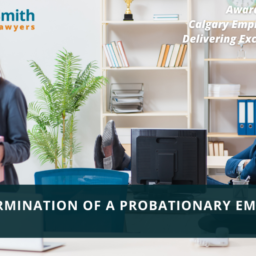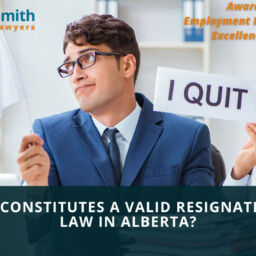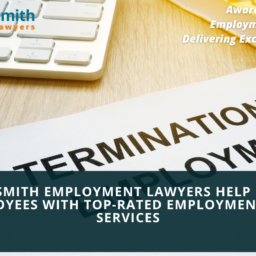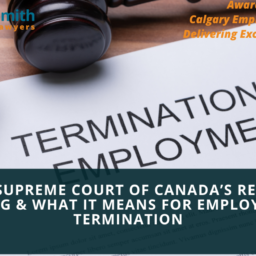Employment Termination and Wrongful Dismissal: What You Need to Know
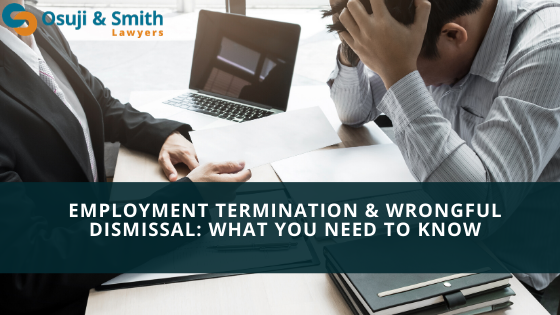 Getting fired is always stressful but especially when you’ve done nothing wrong. Understand your rights after being fired to ensure you’re treated fairly and reduce some of the stress. In this post, our wrongful dismissal lawyers in Calgary tell you what you need to know about wrongful dismissal in Alberta.
Getting fired is always stressful but especially when you’ve done nothing wrong. Understand your rights after being fired to ensure you’re treated fairly and reduce some of the stress. In this post, our wrongful dismissal lawyers in Calgary tell you what you need to know about wrongful dismissal in Alberta.
Employment termination in Alberta is governed by the Employment Standards Code and the Alberta Human Rights Act. Non-union employers can legally terminate employees as long as they don’t violate this legislation.
Wrongful dismissal is when an employer fires an employee without a legal reason to do so. In other words, the employer fails to protect the legal rights of the employee. It’s a breach of common employment law standards.
You might have been wrongfully dismissed if one of the following applies to your situation:
- You were fired based on false allegations. (Your employer claims they have a right to fire you because you’ve done something wrong or illegal even though there is no proof to back up the allegations.)
- You were not given reasonable notice or your employer fails to pay the full amount you have a right to upon termination of your employment (such as severance, notice period pay, vacation pay, or your final pay).
- The terms of your employment contract were changed without your agreement.
In Alberta, your employer is required to give you reasonable notice of your dismissal or pay in lieu (the amount you would earn if you were still employed for your notice period). Employers must also have just cause to fire you (reasons for termination allowed by the law).
If you were a unionized employee, your dismissal is governed by your union agreement.
What is Reasonable Notice of Employment Termination?
If your employer fires you without cause, they are legally required to give you reasonable notice – advance notice of your job termination. If they want you to stop work immediately, they must pay you for the time of the notice period. This is called “severance pay in lieu of notice”.
Factors to Determine Length of Reasonable Notice
There are several factors to determine the appropriate length of reasonable notice under common law principles. These apply when your employment contract does not specify a statutory minimum. The factors include:
- The length of your employment
- The position you held
- The current market to find a new job in the same field
- Your salary or wage
Reasonable Notice Time Periods
The minimum notice periods defined by the Alberta Employment Standards Code (Section 56) are as follows:
- 1 week – if you were employed for less than 2 years (but more than 90 days)
- 2 weeks – if you were employed for less than 4 years (but a minimum of 2)
- 4 weeks – if you were employed for less than 6 years (but a minimum of 4)
- 5 weeks, if you were employed for less than 8 years (but a minimum of 6)
- 6 weeks – if you were employed for less than 10 years (but a minimum of 8)
- 8 weeks – if you were employed for 10 years or more
Reasonable Notice Exceptions
There are certain situations in which your employer is not legally required to give you reasonable notice:
- You were employed for only 3 months or less.
- Your employer has just cause for termination.
- You refuse reasonable alternative work.
Even if you did not have a signed employment contract you are still entitled to reasonable notice when you’ve been terminated without cause. If the reasonable notice wasn’t given, your employer might still have an obligation to pay you in lieu.
If you did have a signed employment contract which contained a termination clause that lessened your entitlement to reasonable notice and/or severance pay, you may still be entitled to notice or severance. This is dependent on the wording of the contract; it must be legally enforceable. Consult an employment lawyer.
What is Constructive Dismissal?
Constructive dismissal is when an employer significantly changes the terms of your employment contract without advance notice or without your consent. Examples of these changes include a reduction of your salary or redefining your primary job duties.
This is another form of wrongful dismissal and you have the same rights in a constructive dismissal case.
What is Termination with Just Cause?
A termination with just cause is not a wrongful dismissal. If you’ve been fired with just cause, your employer had a legal right to terminate your employment.
A just cause termination involves 2 aspects:
- the reason for termination and
- the steps the employer took leading up to the termination.
Legal Reasons for Termination
Acceptable reasons for termination include:
- An employee is drunk or high at work
- An employee commits fraud or theft
- Employee exhibits violence or harassment in the workplace
- An employee is repeatedly absent or late without reasonable excuse
Basically, the employee must seriously misconduct themselves or act illegally in the workplace to constitute just cause dismissal. Just cause does not include unsatisfactory work performance or occasional lateness (unless there is a clear pattern with documented warnings).
Employers are prohibited from terminating employees because of age, race, gender, and other personal factors. It is also illegal for them to fire an employee who is starting maternity or paternity leave.
It is your employer’s responsibility to prove just cause.
What to do if You’ve Been Wrongfully Dismissed
If you’ve been terminated from your job and you think you might have been wrongfully dismissed, talk to a wrongful dismissal lawyer. The wrongful dismissal lawyers at Osuji & Smith in Calgary, Alberta can help you understand your legal rights, evaluate your position, and determine what a fair settlement would look like for you.
Don’t Sign Anything Yet!
First things first: DO NOT SIGN ANY DOCUMENTS from your employer before obtaining legal advice. It’s common for employers to ask you to sign a release or severance offer, but let them know you will take time to review the document with legal counsel first.
You Still Have a Responsibility
Even if you’ve been wrongfully terminated, you have a legal duty to mitigate (lessen) the damages you might incur by taking reasonable action to secure alternative employment. You’re responsible to look for a new job while you pursue a claim against your former employer.
Deadline to File a Wrongful Dismissal Claim
In Alberta, you must file your wrongful dismissal claim within 2 years of your termination notice.
Know Your Rights After Being Wrongfully Dismissed
If your wrongful dismissal lawyer determines that your employer violated the employment laws of Alberta, you may pursue damages (sue for wrongful dismissal). There are 3 types of damages that apply to wrongful dismissal cases:
- Notice Period Payment – This is the money you would make during the reasonable notice time period your employer is required to pay you for.
- Extra Compensation – This is money to compensate for mental distress caused by a wrongful dismissal that was humiliating or cruel.
- Punitive Damages – This is more common in the US than in Canada. It’s intended to be a deterrent or punishment to prevent the employer from wrongfully dismissing employees again. This is typically only pursued in cases where the dismissal was malicious or excessive.
Legal Advice for Wrongful Dismissal in Calgary
Consult an employment lawyer in Alberta to determine if you’ve been wrongfully dismissed.
The lawyers of Osuji & Smith will take the time to listen to your story, offer options based on your background and experience, and suggest a plan to move forward. We can effectively negotiate terms with your employer. If negotiations don’t produce the desired result, we can file your claim.
For employment termination legal advice in Alberta, contact Osuji & Smith today.


